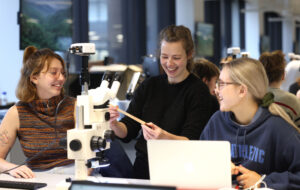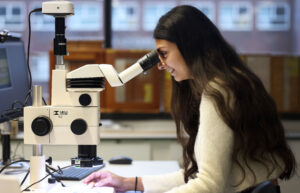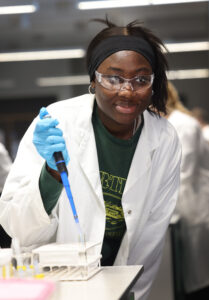Clearing 2025
Clearing places have been filled on this course for 2025 entry.
Geography
UCAS code F800
- Study mode
- Full-time
- Duration
- 3 years
- Start date and application deadlines
-
- Start date
Clearing places have been filled on this course for 2025 entry.
UCAS code F800
Geography offers unique insights into many of the most pressing issues facing the world in the 21st century, such as climate change, living with environmental change, sustainability, hazards, pollution, and natural resource management. Our Geography BSc (Hons) course helps you develop expert knowledge and skills to interrogate the range of different approaches to, and perspectives on, these issues, as well as the ability to understand how they interact.
The University of Liverpool is home to one of the longest established Geography departments in the world, with courses on offer since 1886. Our expertise in physical geography spans climate change (past, present and future), rivers and flooding, glaciology and ice sheets, coastal dynamics and management, vegetation change, sustainability, natural hazards and living with environmental change.
The Geography BSc (Hons) programme explores important questions about whether our planet’s natural resources can sustain an increasing population, how physical earth systems respond to human activity and changing climate, how we manage our resources, and how we live with environmental change. If you are passionate about environmental issues and addressing problems on a local and global scale, this is the programme for you.
Many people who take the Geography BSc (Hons) programme choose physical geography modules, which are more scientifically based. However, the full range of human geography modules is also open to you and the flexibility of the degree allows you to shape your own programme of study. This means that you can either specialise in physical geography or study both physical and human geography as part of a BSc degree.
You can also take up to two 15 credit modules per year from other subjects so you can maintain an interest in another discipline as part of your BSc Geography degree. We will guide you in your module choice to ensure that you choose modules that complement each other and follow a pathway that will help you to gain skills and knowledge relevant to your future career.
A number of the School’s degree programmes involve laboratory and field work. Fieldwork is carried out in various locations, ranging from inner city to coastal and mountainous environments. We consider applications from prospective disabled students on the same basis as all other students, and reasonable adjustments will be considered to address barriers to access.
This programme is accredited by the Royal Geographical Society (with IBG)
The Royal Geographical Society (with IBG) is the UK's learned society and professional body for geography.

We’re proud to announce we’ve been awarded a Gold rating for educational excellence.
Discover what you'll learn, what you'll study, and how you'll be taught and assessed.
In order to give a strong foundation to your degree, all students take core modules in year one, which introduce you to the breadth of the subject and give you a grounding in the key concepts and skills which are integral to the rest of the course. You then get a choice of optional modules from within physical or human geography, or from other disciplines including geology, oceanography, ecology, earth sciences, life sciences, modern languages, sociology, psychology, and planning amongst many others.
Students will take the following compulsory modules and select from the optional modules detailed below.
Programme details and modules listed are illustrative only and subject to change.
In year two, skills development is a central part of the course, including a week-long field class to Lorca, Spain. You can then choose additional modules from a range of physical geography specialisms, including Climatology, Catchment hydrology, Geomorphology: ice, sea and air, and Soils, slopes and the environment, along with human geography modules and those from other disciplines.
Students will take the following compulsory modules and select from the optional modules detailed below.
| Compulsory modules | Credits |
|---|---|
| PHYSICAL GEOGRAPHY FIELDWORK COURSE (ENVS228) | 15 |
| PRINCIPLES AND THEORY IN GEOGRAPHY (ENVS249) | 15 |
| RESEARCH SKILLS AND EMPLOYABILITY (ENVS203) | 15 |
Programme details and modules listed are illustrative only and subject to change.
In year three, you will complete a dissertation, which brings together the skills and techniques you have learned in the degree to produce an independent piece of academic research. There are also opportunities for overseas field study.
Students will select compulsory dissertation or work-based dissertation modules (30 credits) in addition to six (four if taking the optional field class module) of the optional modules detailed below.
| Compulsory modules | Credits |
|---|---|
| DISSERTATION (GEOGRAPHY & ENVIRONMENTAL SCIENCE) (ENVS321) | 30 |
Programme details and modules listed are illustrative only and subject to change.
To help you meet the intellectual and practical challenges of studying Geography, our programmes are taught using a student centred approach, involving a range of learning experiences. These include:
A number of the School’s degree programmes involve laboratory and fieldwork. The fieldwork is carried out in various locations, ranging from inner city to coastal and mountainous environments. We consider applications from prospective students with disabilities on the same basis as all other students, and reasonable adjustments will be considered to address barriers to access.
Assessments are designed around developing skills and styles of communication that will be relevant to future employers. So, in addition to exams and essays, you will also undertake assessments that include computer-based exercises, oral presentations, policy briefs, field projects, and research reports. Single Honours Geography students complete a compulsory 10,000-word dissertation in their final year on a topic of their choice. This is your opportunity to develop skills as an independent academic researcher, supported on a one-to-one basis by an expert in the field.
We have a distinctive approach to education, the Liverpool Curriculum Framework, which focuses on research-connected teaching, active learning, and authentic assessment to ensure our students graduate as digitally fluent and confident global citizens.
The Liverpool Curriculum framework sets out our distinctive approach to education. Our teaching staff support our students to develop academic knowledge, skills, and understanding alongside our graduate attributes:
Our curriculum is characterised by the three Liverpool Hallmarks:
All this is underpinned by our core value of inclusivity and commitment to providing a curriculum that is accessible to all students.
The qualifications and exam results you'll need to apply for this course.
| Qualification | Details |
|---|---|
| A levels |
BCC (including Geography: B) |
| BTEC Level 3 national extended diploma |
DMM |
| BTEC combinations |
BTEC National Diploma MM plus Geography grade B at A level; BTEC National Extended Certificate M plus grade BC at A level including Geography grade B. |
| Welsh Baccalaureate Advanced |
C in the Welsh Baccalaureate, plus BC at A level to include Geography grade B at A level. |
| Access |
Pass relevant Access to HE Diploma with 45 Level 3 credits with 27 at Distinction and 18 at Merit |
Studying with us means you can tailor your degree to suit you. Here's what is available on this course.
University of Liverpool students can choose from an exciting range of study placements at partner universities worldwide. Choose to spend a year at XJTLU in China or a year or semester at an institution of your choice.
Immerse yourself in Chinese culture on an optional additional year at Xi'an Jiaotong Liverpool University in stunning Suzhou.
Broaden your world by spending an additional year of study at a partner university abroad following your second year of study.
Take a semester of your second year of study at one of our worldwide partner institutions.
Spend a summer abroad on a study placement or research project at one of our worldwide partner institutions.
Year in industry placements give you an in-depth workplace experience where you can develop your skills and apply your learning.
You don't need to decide now - you can choose to add a year in industry after you've begun your degree.
To spend a year in industry, you'll need to secure a placement with an organisation. If you're unable to find a placement, you'll continue with the standard version of the course without a year in industry.
Every student at The University of Liverpool can study a language as part of, or alongside their degree. You can choose:
Day-to-day teaching takes place in the Central Teaching Laboratory (CTL) and Roxby Building. The CTL houses industry-standard equipment, including one of the few staffed map collections in the country, containing over 100,000 maps, 600 atlases, and access to digital data. Your course will be delivered by the Department of Geography and Planning.






From arrival to alumni, we’re with you all the way:
Geography is one of the few subjects where you can develop an understanding of contemporary social science alongside cutting-edge natural science. Particularly in third year, there are elective modules with a very broad spectrum that will satisfy your intellectual intrigue.

Want to find out more about student life?
Chat with our student ambassadors and ask any questions you have.
Geography is a subject that bridges the social and physical sciences. Those studying geography develop transferable knowledge and skills which open up a wide range of career opportunities.
By the time you graduate you will have developed core research skills in human geography, including surveying, interviewing and innovative community liaison techniques stand students in good stead for a range of employment destinations.
You can explore the following work experience opportunities:
Students can also continue their studies at postgraduate level and PhD study with opportunities to apply for funding from a range of organisations, including the ESRC (Economic and Social Research Council) and NERC (Natural Environment Research Council). Geography is a subject that bridges the social and physical sciences. Those studying geography develop transferable knowledge and skills which open up a wide range of career opportunities.
We encourage students to undertake work experience and internships during the course of their degree. Our students can also select a work-based dissertation, which combines the final year independent research project with a placement in industry.
90% of geography and planning students are in work and/or further study 15 months after graduation.
(Discover Uni, 2018-19.)
Your tuition fees, funding your studies, and other costs to consider.
Full-time place, per year - £9,535
Year in industry fee - £1,905
Year abroad fee - £1,430 (applies to year in China)
Full-time place, per year - £29,100
Year in industry fee - £1,905
Year abroad fee - £14,550 (applies to year in China)
The tuition fees shown are correct for 2025/26 entry. Please note that the year abroad fee also applies to the year in China.
Tuition fees cover the cost of your teaching and assessment, operating facilities such as libraries, IT equipment, and access to academic and personal support. Learn more about paying for your studies.
We understand that budgeting for your time at university is important, and we want to make sure you understand any course-related costs that are not covered by your tuition fee. This could include expenses such as field clothing and sustenance (food and drinks) during fieldwork.
Find out more about the additional study costs that may apply to this course.
We offer a range of scholarships and bursaries that could help pay your tuition and living expenses.
If you’re a UK student joining an undergraduate degree and have a household income below £35,000, you could be eligible for a Liverpool Bursary worth up to £2,000 for each year of undergraduate study.
Apply for an Asylum Seekers Scholarship and you could have your tuition fees paid in full and receive help with study costs. You’ll need to have applied for asylum in the UK, or be the dependant of an asylum seeker, and be joining an eligible undergraduate degree.
If you’ve spent 13 or more weeks in Local Authority care since age 14, you could be eligible for a bursary of £3,000 per year of study. You’ll need to be a UK student joining an eligible undergraduate degree and be aged 28 or above on 1 September in the year you start.
Are you a UK student with a Black African or Caribbean heritage and a household income of £25,000 or less? You could be eligible to apply for a Cowrie Foundation Scholarship worth up to £8,000 for each year of undergraduate study.
If you’re a UK student identified as estranged by Student Finance England (or the equivalent UK funding body), you could be eligible for a bursary of £1,000 for each year of undergraduate study.
Joining a School of Biosciences degree and have a household income of less than £25,000? If you’re a UK student, you could apply to receive £4,500 per year for three years of your undergraduate course.
Do you live in the Liverpool City Region with a household income of £25,000 or less? Did neither of your parents attend University? You could be eligible to apply for a Nolan Scholarship worth £5,000 per year for three years of undergraduate study.
Are you a UK student with a household income of £25,000 or less? If you’ve participated in an eligible outreach programme, you could be eligible to apply for a Rigby Enterprise Award worth £5,000 per year for three years of your undergraduate degree.
Are you a UK student with a household income of £25,000 or less? Did neither of your parents attend University? You could be eligible to apply for a ROLABOTIC Scholarship worth £4,500 for each year of your undergraduate degree.
Apply to receive tailored training support to enhance your sporting performance. Our athlete support package includes a range of benefits, from bespoke strength and conditioning training to physiotherapy sessions and one-to-one nutritional advice.
Joining a degree in the School of Electrical Engineering, Electronics and Computer Science? If you’re a UK student with household income below £25,000, you could be eligible to apply for £5,000 a year for three years of study. Two awards will be available per academic year.
If you’re a young adult and a registered carer in the UK, you might be eligible for a £1,000 bursary for each year of study. You’ll need to be aged 18-25 on 1 September in the year you start your undergraduate degree.
Have a question about this course or studying with us? Our dedicated enquiries team can help.
Last updated 14 August 2025 / / Programme terms and conditions